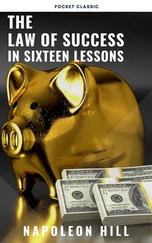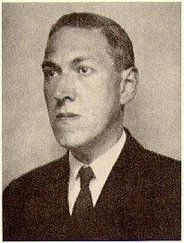For the same reason the manufacturers of automobiles (with a few rare and very sensible exceptions) change styles every season.
The manufacturer of clothing knows how the man-animal fears to wear a garment which is one season out of step with “that which they are all wearing now.”
Is this not true? Does not your own experience back it up?
We have been describing the manner in which people behave under the influence of the fear of Criticism as applied to the small and petty things of life. Let us now examine human behavior under this fear when it affects people in connection with the more important matters connected with human intercourse. Take, for example, practically any person who has reached the age of “mental maturity” (from thirty-five to forty-five years of age, as a general average), and if you could read his or her mind you would find in that mind a very decided disbelief of and rebellion against most of the fables taught by the majority of the religionists.
Powerful and mighty is the fear of CRITICISM!
The time was, and not so very long ago at that, when the word “infidel” meant ruin to whomsoever it was applied. It is seen, therefore, that man’s fear of CRITICISM is not without ample cause for its existence.
The fourth basic fear is that of:
THE FEAR OF LOSS OF LOVE OF SOMEONE: The source from which this fear originated needs but little description, for it is obvious that it grew out of man’s nature to steal his fellow man’s mate; or at least to take liberties with her, unknown to her rightful “lord” and master. By nature all men are polygamous, the statement of a truth which will, of course, bring denials from those who are either too old to function in a normal way sexually, or have, from some other cause, lost the contents of certain glands which are responsible for man’s tendency toward the plurality of the opposite sex.
There can be but little doubt that jealousy and all other similar forms of more or less mild dementia praecox (insanity) grew out of man’s inherited fear of the Loss of Love of Someone.
Of all the “sane fools” studied by this author, that represented by a man who has become jealous of some woman, or that of a woman who has become jealous of some man, is the oddest and strangest. The author, fortunately, never had but one case of personal experience with this form of insanity, but from that experience he learned enough to justify him in stating that the fear of the Loss of Love of Someone is one of the most painful, if not in fact the most painful, of all the six basic fears. And it seems reasonable to add that this fear plays more havoc with the human mind than do any of the other six basic fears, often leading to the more violent forms of permanent insanity.
The fifth basic fear is that of:
THE FEAR OF ILL HEALTH: This fear has its origin, to considerable extent also, in the same sources from which the fears of Poverty and Old Age are derived.
The fear of Ill Health must needs be closely associated with both Poverty and Old Age, because it also leads toward the border line of “terrible worlds” of which man knows not, but of which he has heard some discomforting stories.
The author strongly suspects that those engaged in the business of selling good health methods have had considerable to do with keeping the fear of Ill Health alive in the human mind.
For longer than the record of the human race can be relied upon, the world has known of various and sundry forms of therapy and health purveyors. If a man gains his living from keeping people in good health it seems but natural that he would use every means at his command for persuading people that they needed his services. Thus, in time, it might be that people would inherit a fear of Ill Health.
The sixth and last of the six basic fears is that of:
THE FEAR OF DEATH: To many this is the worst of all the six basic fears, and the reason why it is so regarded becomes obvious to even the casual student of psychology.
The terrible pangs of fear associated with DEATH may be charged directly to religious fanaticism, the source which is more responsible for it than are all other sources combined.
So-called “heathen” are not as much afraid of DEATH as are the “civilized,” especially that portion of the civilized population which has come under the influence of theology.
For hundreds of millions of years man has been asking the still unanswered (and, it may be, the unanswerable) questions, “WHENCE?” and “WHITHER?” “Where did I come from and where am I going after death?”
The more cunning and crafty, as well as the honest but credulous, of the race have not been slow to offer the answer to these questions. In fact the answering of these questions has become one of the so-called “learned” professions, despite the fact that but little learning is required to enter this profession.
Witness, now, the major source of origin of the fear of DEATH!
“Come into my tent, embrace my faith, accept my dogmas (and pay my salary) and I will give you a ticket that will admit you straightway into heaven when you die,” says the leader of one form of sectarianism. “Remain out of my tent,” says this same leader, “and you will go direct to hell, where you will burn throughout eternity.”
While, in fad, the self-appointed leader may not be able to provide safe-conduct into heaven nor, by lack of such provision, allow the unfortunate seeker after truth to descend into hell, the possibility of the latter seems so terrible that it lays hold of the mind and creates that fear of fears, the fear of DEATH!
In truth no man knows, and no man has ever known, what heaven or hell is like, or if such places exist, and this very lack of definite knowledge opens the door of the human mind to the charlatan to enter and control that mind with his stock of legerdemain and various brands of trickery, deceit and fraud.
The truth is this — nothing less and nothing more -That NO MAN KNOWS NOR HAS ANY MAN EVER KNOWN WHERE WE COME FROM AT BIRTH OR WHERE WE GO AT DEATH. Any person claiming otherwise is either deceiving himself or he is a conscious impostor who makes it a business to live without rendering service of value, through play upon the credulity of humanity.
Be it said, in their behalf, however, the majority of those engaged in “selling tickets into heaven” actually believe not only that they know where heaven exists, but that their creeds and formulas will give safe passage to all who embrace them.
This belief may be summed up in one word -CREDULITY!
Religious leaders, generally, make the broad, sweeping claim that the present civilization owes its existence to the work done by the churches. This author, as far as he is personally concerned, is willing to grant their claims to be correct, if, at the same time he be permitted to add that even if this claim be true the theologians haven’t a great deal of which to brag.
But, it is not — cannot be — true that civilization has grown out of the efforts of the organized churches and creeds, if by the term “civilization” is meant the uncovering of the natural laws and the many inventions to which the world is the present heir.
If the theologians wish to claim that part of civilization which has to do with man’s conduct toward his fellow man they are perfectly welcome to it, as far as this author is concerned; but, on the other hand, if they presume to gobble up the credit for all the scientific discovery of mankind the author begs leave to offer vigorous protest.
It is hardly sufficient to state that social heredity is the method through which man gathers all knowledge that reaches him through the five senses. It is more to the point to state HOW social heredity works, in as many different applications as will give the student a comprehensive understanding of that law.
Читать дальше












